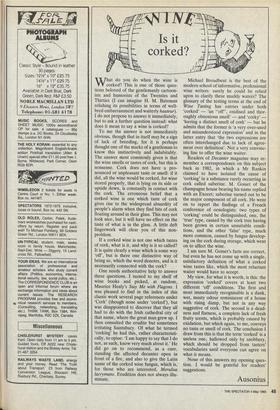is it
corked?
what do you do when the wine is corked? This is one of those ques- tions beloved of the gentlemanly cartoon- ists and humorists of the Twenties and Thirties (I can imagine H. M. Bateman relishing its possibilities in terms of well- bred embarrassment and waiterly hauteur). I do not propose to answer it immediately, but to ask a further question instead: what does it mean to say a wine is corked?
To me the answer is not immediately obvious, though that in itself may be a sign of lack of breeding, for it is perhaps thought one of the marks of a gentleman to know this instinctively and indubitably. The answer most commonly given is that the wine smells or tastes of cork, but this is nonsense. Cork does not have a pro- nounced or unpleasant taste or smell: if it did, all the wine would be corked, for wine stored properly, that is lying on its side or upside down, is constantly in contact with the cork. The erroneous belief that a corked wine is one which taste of cork gives rise to the widespread absurdity of people's alarm when they find bits of cork floating around in their glass. This may not look nice, but it will have no effect on the taste of what is in the glass. A little deft fingerwork will clear you of this non- problem.
If a corked wine is not one which tastes of cork, what is it, and why is it so called? It is quite clearly a wine which is some way 'off, but is there one distinctive way of being so, which the word denotes, and is it necessarily connected with the cork?
One needs authoritative help to answer these questions. I turned to my shelf of wine books and picked, at random, Maurice Healy's Stay Me with Flagons. I was pleased to find in the index of this classic work several page references under `Cork' (though none under `corked), but
was disappointed to discover that they all had to do with the Irish cathedral city of that name, where the great man grew up. I then consulted the erudite but sometimes irritating Saintsbury. Of what he termed 'corking' he had this, rather characteristi- cally, to opine: `I am happy to say that I do not, as such, know very much about it.' He did go on to recommend, as a cure, standing the affected decanter open in front of a fire, and also to give the Latin
name of the corked wine fungus, which is, for those who are interested, Merulius lacrymans. Erudition does not always illu- minate. Michael Broadbent is the best of the modern school of informative, professional wine writers: surely he could be relied upon to clarify these muddy waters? The glossary of the testing terms at the end of Wine Tasting has entries under both 'corked' — `an "off', oxidised and thor- oughly obnoxious smell' — and 'corky' — `having a distinct smell of cork' — but he admits that the former is `a very over-used and misunderstood expression' and in the latter entry that 'the two expressions are often interchanged due to lack of agree- ment over definition'. Not a very convinc- ing line to offer the wine waiter.
Readers of Decanter magazine may re- member a correspondence on this subject back in 1982, in which a Mr Rankin claimed to have isolated the cause of `corking' in a substance rarely occurring in cork called suberine. M. Gosset of the champagne house bearing his name replied with an Exocet: suberine turned out to be the major component of all cork. He went on to report the findings of a French conference of oenologists: two types of `corking' could be distinguished, one, the `true' type, caused by the cork tree having been grown in certain unsuitable condi- tions, and the other `false' type, much more common, caused by fungus develop- ing on the cork during storage, which went on to affect the wine.
I am sure M. Gosset's facts are correct, but even he has not come up with a single, satisfactory definition of what a corked wine tastes like, which the most reluctant waiter would have to accept.
My view, for what it is worth, is this: the expression `corked' covers at least two different 'off conditions. The first and most immediately recognisable is a dank, wet, musty odour reminiscent of a house with rising damp, but not in any way suggestive of cork. The second is a dead- ness and flatness, a complete lack of fresh fruity scents, which is probably caused by oxidation, but which again, to me, conveys no taste or smell of cork. The conclusion I draw from this is that the term `corked' is a useless one, hallowed only by snobbery, which should be dropped from tasters' vocabularies until everyone can agree on what it means.
None of this answers my opening ques- tion. I would be grateful for readers' suggestions.
Ausonius


















































 Previous page
Previous page